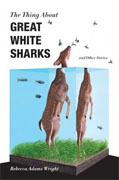The Thing About Great White Sharks and Other Stories
Rebecca Adams Wright
book reviews:
· general fiction
· chick lit/romance
· sci-fi/fantasy
· graphic novels
· nonfiction
· audio books
· author interviews
· children's books @
curledupkids.com
· DVD reviews @
curledupdvd.com
newsletter
win books
buy online
links
home
for authors
& publishers
for reviewers

 |
The Thing About Great White Sharks and Other Stories Rebecca Adams Wright Little A Paperback 182 pages February 2015 |
|
Almost nothing seems off limits in The Thing About Great White Sharks and Other Stories
Still, broad reader appeal can be satisfied because if one style is disliked, it will end soon enough and be replaced by a different type of story altogether. Not to discourage Wright’s creativity, which is powerful, but her writing needs boundaries so that her message is not lost among corny science fiction that assaults the reader with formulaic B-movie material. “Yuri, In A Blue Dress” is a forgettable story that vaguely describes an insurrection against an alien force, and the attempted horror of “What To Expect When You’re Expecting An Alien Parasite” only creates revulsion at the title’s pun-like reference to the classic pregnancy guide. This is not to say that all of Wright’s science fiction-like-tales are bad. “The Other Husband” is a brief narrative that, while predictable, still has some fantastic figurative language: “Remember when we lived on the Jodhpur Station? The stars that sank like coins into black oil so far above the atrium?” (65). These vivid descriptions sometimes save weaker stories like this one, but the strongest stories, by far, are those that have their basis in realism. These stories examine oddities inherent to life and are unencumbered by pathetic monsters. “Melville Loves Hawthorne” is an enjoyable story that examines human loneliness and how we define success but, more importantly, shows the bizarre ways that reality can fail to live up to expectations. Another of the more realistic stories, a gem of the collection, is “Poland, 1952,” which shows the deleterious effects of war on human development. Why, then, the insertion of the fantastical? Because Wright understands the power of the imagination--it has a healing and beneficial quality. In many of these stories, the elements of fantasy, occult, and science fiction function as coping mechanisms for the brutality of life, such as war. The imaginary circumstances allow characters to deal with grief, and this is especially true in two of the collection’s better stories: “Sheila,” where a man confronts losing the robotic pet that has helped him cope with losing his wife, and “The Space We Share,” where two children experience the death of a peer and attempt to revive his ghost, which they may or may not be experiencing. The collection’s final story, “The White Chalk Road,” is nothing short of a masterpiece, a tale that places reality and fantasy side by side, showing how important the intersection of the two is to a person’s life. This truly beautiful story is a fitting end to a collection that shows, for better or worse, there are no limits to the imagination. If what we make up has the ability to heal and help, is there any reason we shouldn’t believe in what we imagine? That seems to be the essential question raised by The Thing About Great White Sharks Originally published on Curled Up With A Good Book at www.curledup.com. © Joshua Myers, 2015 |
|
|
|
 Click here to learn more about this month's sponsor! |
|
| fiction · sf/f · comic books · nonfiction · audio newsletter · free book contest · buy books online review index · links · · authors & publishers reviewers |
|
| site by ELBO Computing Resources, Inc. | |
 The variance in style may account for the stories’ varying lengths as well. The stories range from two pages to seventeen pages and fifteen tales comprise the collection, putting the whole set around one hundred and seventy pages. Regardless of length, blurring the genres potentially increases the “something for everybody” appeal: wide marketability means wide readership. However, a few stories suffer from this chaotic arrangement. Certain tales are comprised of brief paragraphs and labeled sections while other stories have linear arrangements and more ornate descriptions. At times, Wright seems indecisive about which stories work best, which in turn weakens her voice and makes the reader feel experimented on.
The variance in style may account for the stories’ varying lengths as well. The stories range from two pages to seventeen pages and fifteen tales comprise the collection, putting the whole set around one hundred and seventy pages. Regardless of length, blurring the genres potentially increases the “something for everybody” appeal: wide marketability means wide readership. However, a few stories suffer from this chaotic arrangement. Certain tales are comprised of brief paragraphs and labeled sections while other stories have linear arrangements and more ornate descriptions. At times, Wright seems indecisive about which stories work best, which in turn weakens her voice and makes the reader feel experimented on.